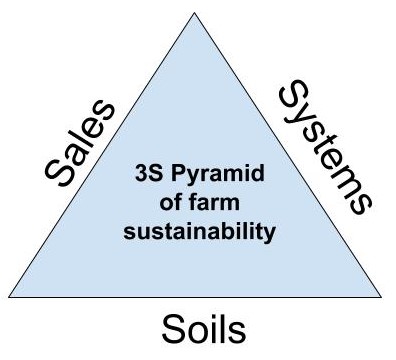Alright! Let’s loop back to continue the discussion of the third leg of the 3S triangle.

I’ve always loved planning. The problem is that these ideas aren’t worth shit if they stay stuck in my head!
What I realised when I started the farm, was that no matter how clear the ideas and plans were in my head, I needed to be able to communicate them effectively to my wife for us to work as a team. This challenge was only exacerbated when we started having employees and the farm crew grew and took on more and more tasks that I had been doing intuitively.
I’m not saying anything new here…. we all know the importance of good planning, effective communication, and record keeping.
The thing is…the time has come for us to consider the flow of information as a cohesive and crucial farm system.
The information flow system is connected to all of the other farm systems. With a well functioning information flow, the farmers and farm staff knows at all times what needs to be done, where, when. In addition they have the means of recording for and communicating this information to the other members of the team. The recorded information serves to get all the staff on the same page, meets Organic or GAP Certification standards, and serves to refine the following year’s planning.
The information flow system is a cycle involving: planning, communication/implementation, record keeping, and data analysis/feedback loop.
Planning:
This is where you get the ideas and information out of your head and onto paper. Key elements are: Crop plan, 2-3 year business plan, financial plan/cash-flow forecasts, fertilisation plan, clear and labeled farm map, and standard operating procedures for common farm tasks.
The idea is to shift some of the work from the busy summer months to the winter. The better our season is planned out during the winter, the more we can focus on the actual implementation during the summer
Communication/Implementation:
Now that you’ve go these plans onto paper… how are the people in the field going to access the information when they need it?
The key is to have the necessary information available right where it will be used. So…plastified charts taped to the wall in workstations, dedicated binders in the greenhouse, in the direct seeding action pack, on the tractor, etc. We need to be able to access it immediately, not have to go up to the barn/packshed to get it from a central binder…. or even worse.. running after the farmer to get some important detail out of her head.
The other element of communication regular crew meetings, and the use of written task lists rather than oral instructions.
Record Keeping:
Do not gather excess data! Record keeping takes time and excess data reduces the chances that any of the data will ever actually get used.
What questions are you seeking to answer?
What data do you need to gather in order to answer those questions?
What data are you required to gather for fiscal or third party certification processes?
Data that will be processed goes directly into a cloud based spreadsheet whenever possible to eliminate the need for data entry (which is a tremendous barrier to the data ever actually being used).
Record keeping materials (computer or paper) located directly where the activity takes place.
Keep a pen tethered to all paper based record keeping locations (a pen taped to a piece of baler twine and stapled to the wall does a great job).
Allocate time in the day for staff to keep records up to date: record keeping takes time and this time is profitable.
Data analysis
Ok.. so you’ve got all these records.. now what?
Records exist mainly to inform future decision making processes. To facilitate this we need to reduce the manual data processing as much as possible. Structure your spreadsheet based record keeping systems to automatically process data whenever possible. (Ex: Automatically calculate yields as you record harvest). Also, Structure your spreadsheets to be able to easily filter the data so as to be able to find the needed information for different purposes.
So… what next?
I invite you to get out a piece of paper and map out the flow of information through your farm systems.
Where are the bottlenecks?
Would the farm crew have all the necessary information to function without you for a week?
What would you love to do during your mid-summers vacation week? 😉
